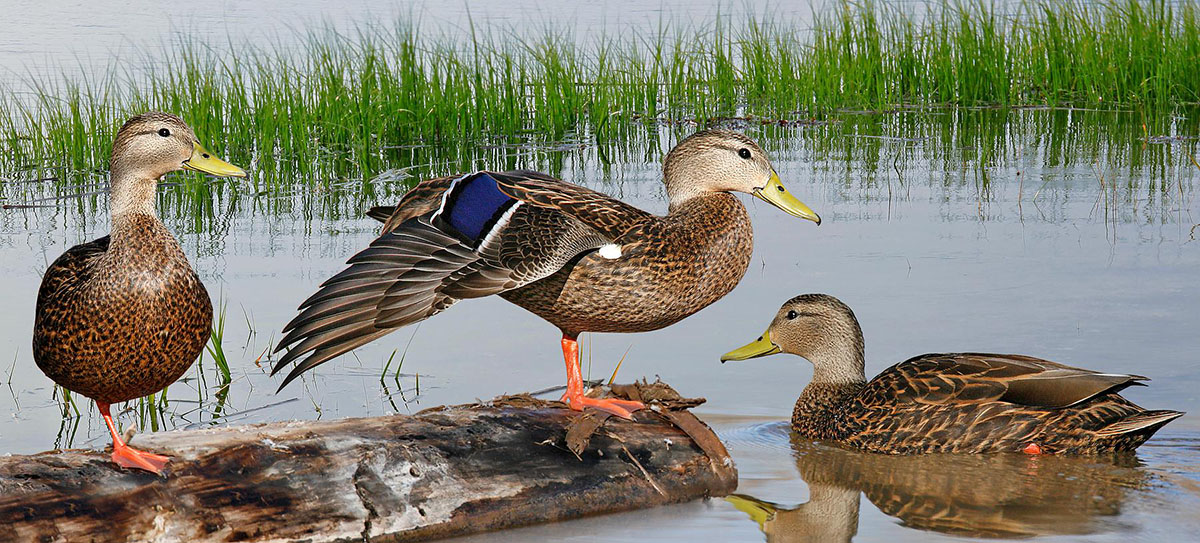Ducks Unlimited Helps Fund Mexican Duck Study
Funding from Ducks Unlimited is helping researchers in the Southwest and Mexico learn more about the Mexican duck, which was recently declared its own species.
Funding from Ducks Unlimited is helping researchers in the Southwest and Mexico learn more about the Mexican duck, which was recently declared its own species.

Ducks Unlimited is helping scientists learn more about the unique lifecycle of the Mexican duck, a mallard-like bird native to Mexico and the Southwestern U.S. that was recently declared its own species.
Ducks Unlimited provided a $50,000 donation that kickstarted a study led by Dr. Philip Lavretsky, a waterfowl scientist at the University of Texas El Paso. Lavretsky’s research will provide some of the first data on Mexican duck migration patterns. Over the next year, Lavretsky’s team and Ducks Unlimited volunteers will capture and place GPS-tracking devices on nearly two dozen Mexican ducks in Arizona to learn more about where these birds spend their lives.
Field data will be used to come up with an official “plumage key” that will help researchers, birders and hunters differentiate Mexican ducks from their cousins, the mottled, black and mallard ducks. Most importantly, the research will provide important information on what habitat Mexican ducks prefer, where they go and just how many there are.
Scientists in 2020 declared the Mexican duck its own species, after Lavretsky’s team analyzed their DNA, proving that the Mexican duck is not going extinct due to hybridization. Importantly, his team showcased that the Mexican duck had a genetic profile substantially distinct from the mallard. The findings settled a longstanding debate over how to classify Mexican ducks that dates to 1967, when the U.S. Fish and Wildlife Service said the Mexican duck was under threat of extinction. The Mexican duck was fully protected when President Richard Nixon signed the U.S. Endangered Species Act into law six years later.
But then federal regulators said they’d made a mistake.
“The interbreeding between the common mallard and the Mexican duck has, by all reliable estimates, been taking place for many hundreds, if not thousands, of years,” federal regulators wrote in 1978 as they explained their rationale to remove the Mexican duck from the Endangered Species List.
Regulators at the time weren’t worried about Mexican ducks going extinct since they would still be protected under the U.S. Migratory Bird Treaty Act, the law that has allowed waterfowl species across North America to again thrive after they were decimated by unregulated market hunting in the late 1800s and early 1900s.
Lavretsky believes Mexican ducks are likely doing quite well, but because they were incorrectly declared a mallard subspecies for so long, there was very little research done on the birds. He suspects they probably have populations well beyond the U.S. Fish and Wildlife Service’s estimate of 50,000 Mexican ducks in North America.
“I can show you a place in Chihuahua where there's Mexican ducks that will blacken the sky,” he said. “They’re obviously surviving and surviving quite well in the landscape. So how are they doing it?”
Based on anecdotal observations, Mexican duck males and females may form pair bonds that last nearly year-round instead of the short, few-month breeding cycle North America’s other ducks have, Lavretsky said. If that proves to be true, that could be a helpful adaptation in the desert since it would allow Mexican ducks to breed whenever there’s enough water on the landscape.
The research that Ducks Unlimited is helping fund will help answer some of these important questions that will allow regulators to properly manage this unique species. The data collected in the study also will be used to determine what sort of habitat Mexican ducks prefer so that it can be protected and expanded.
Ducks Unlimited Inc. is the world's largest nonprofit organization dedicated to conserving North America's continually disappearing wetlands. Established in 1937, Ducks Unlimited has conserved 16 million acres thanks to contributions from more than a million supporters across the continent. For more information, visit www.ducks.org, and be sure to Follow DU's Twitter feed – @DucksUnlimited and @DUConserve – to get the most up-to-date news from Ducks Unlimited.
Media Contact:
Ryan Sabalow, Western Region - Communications Coordinator
(916) 805-1210